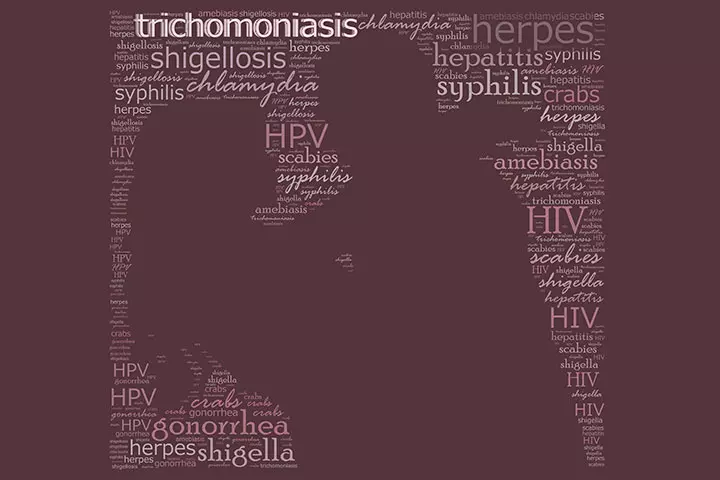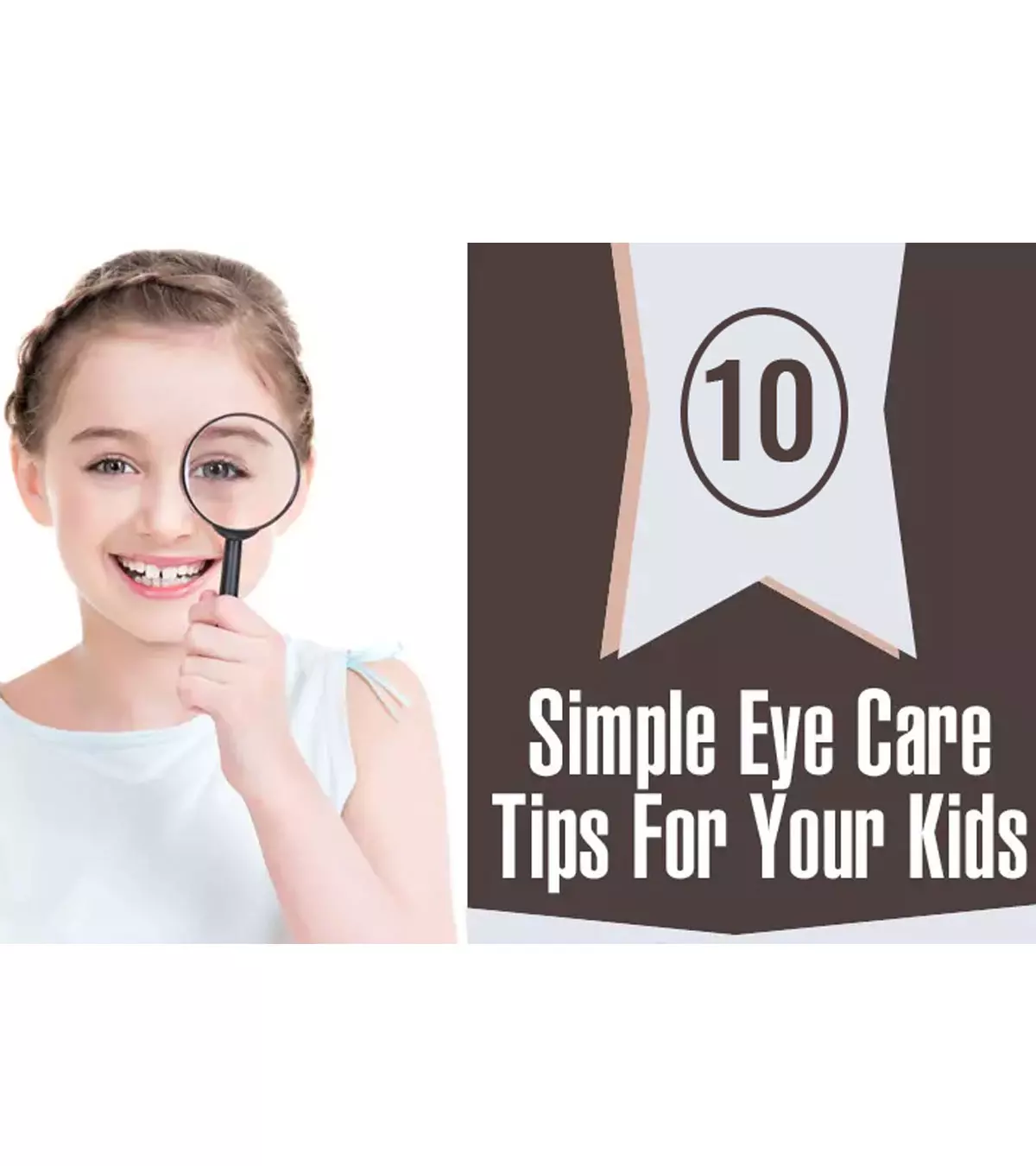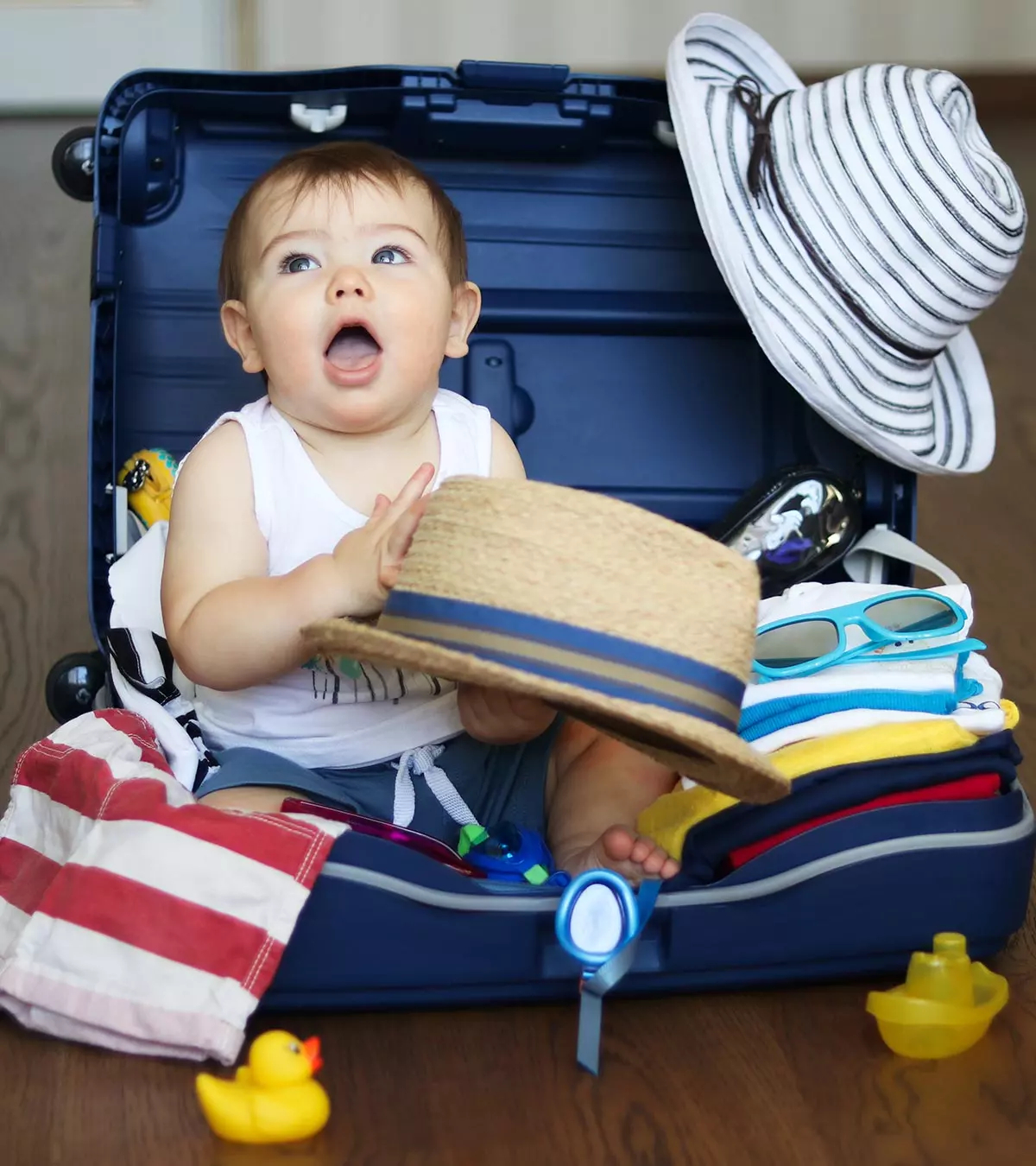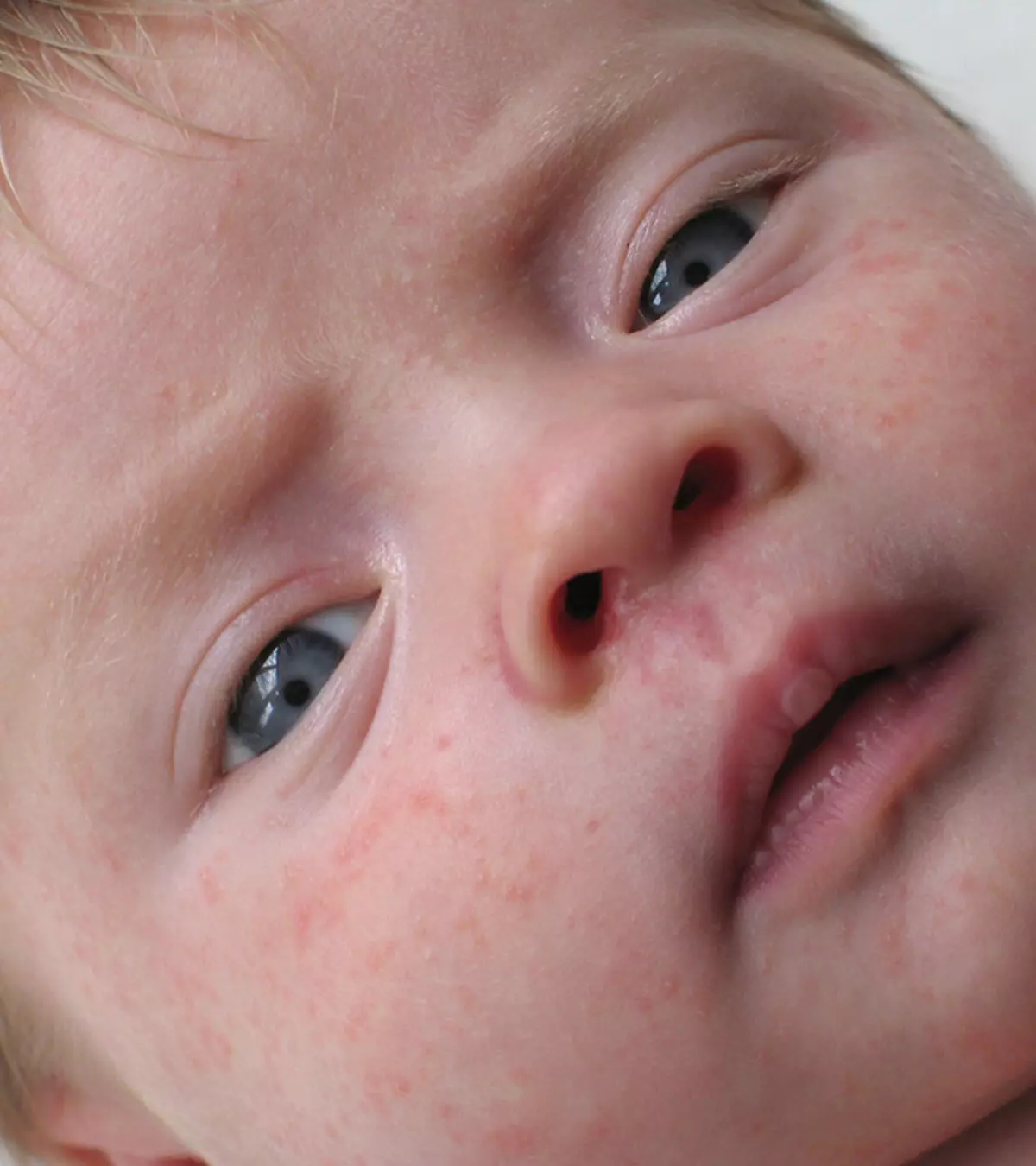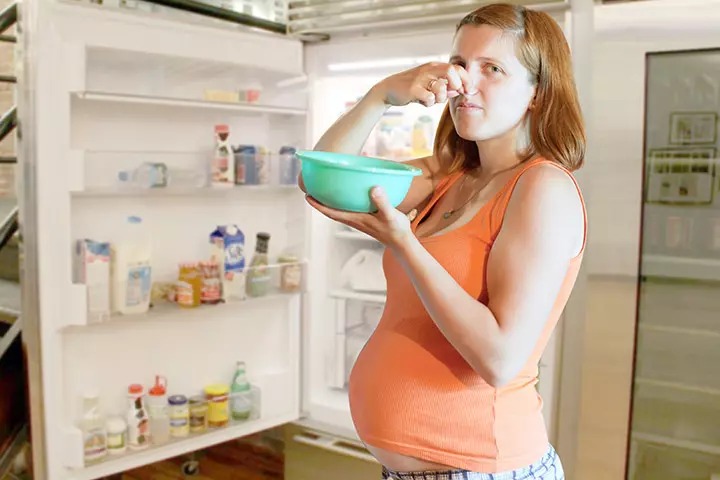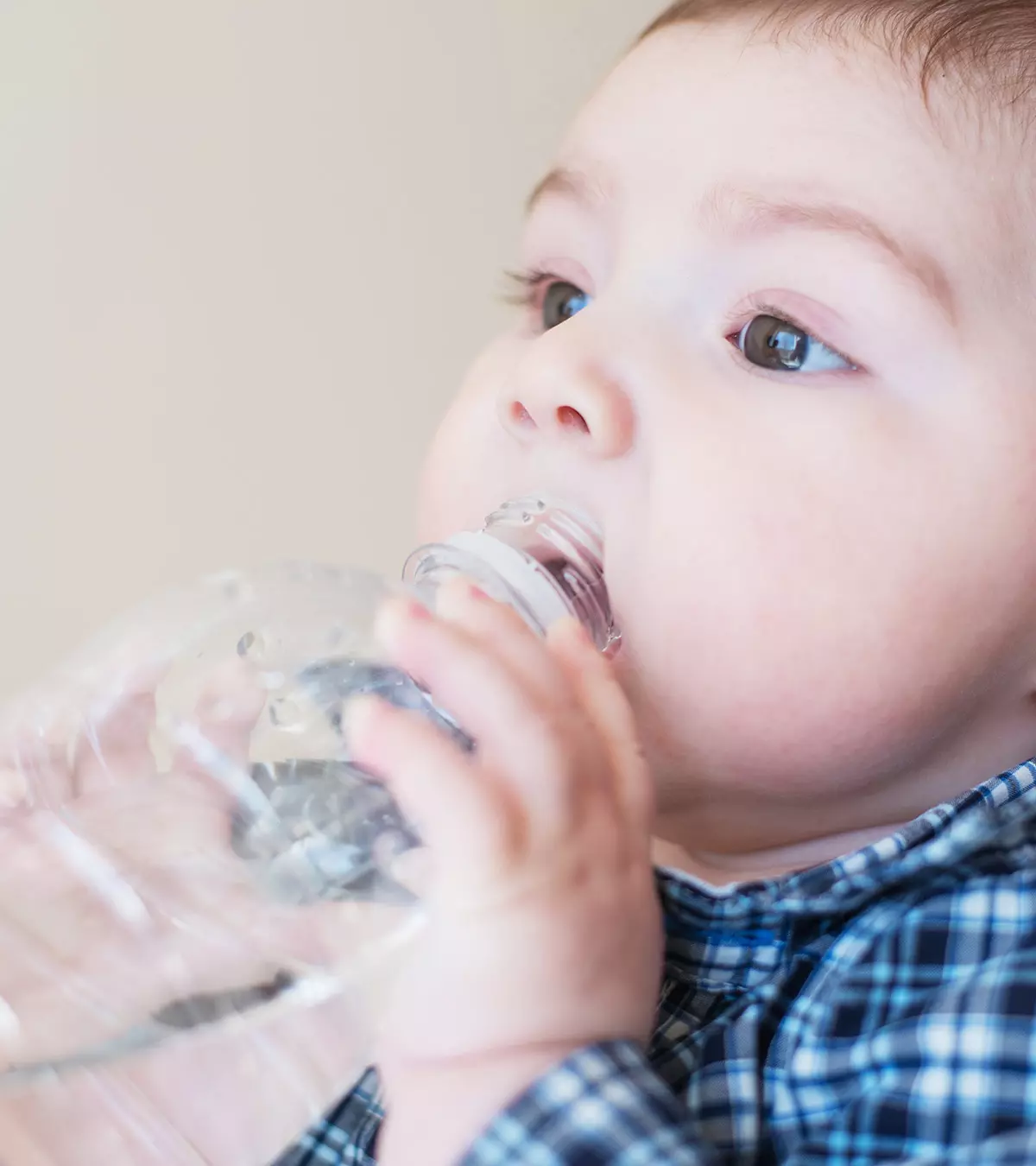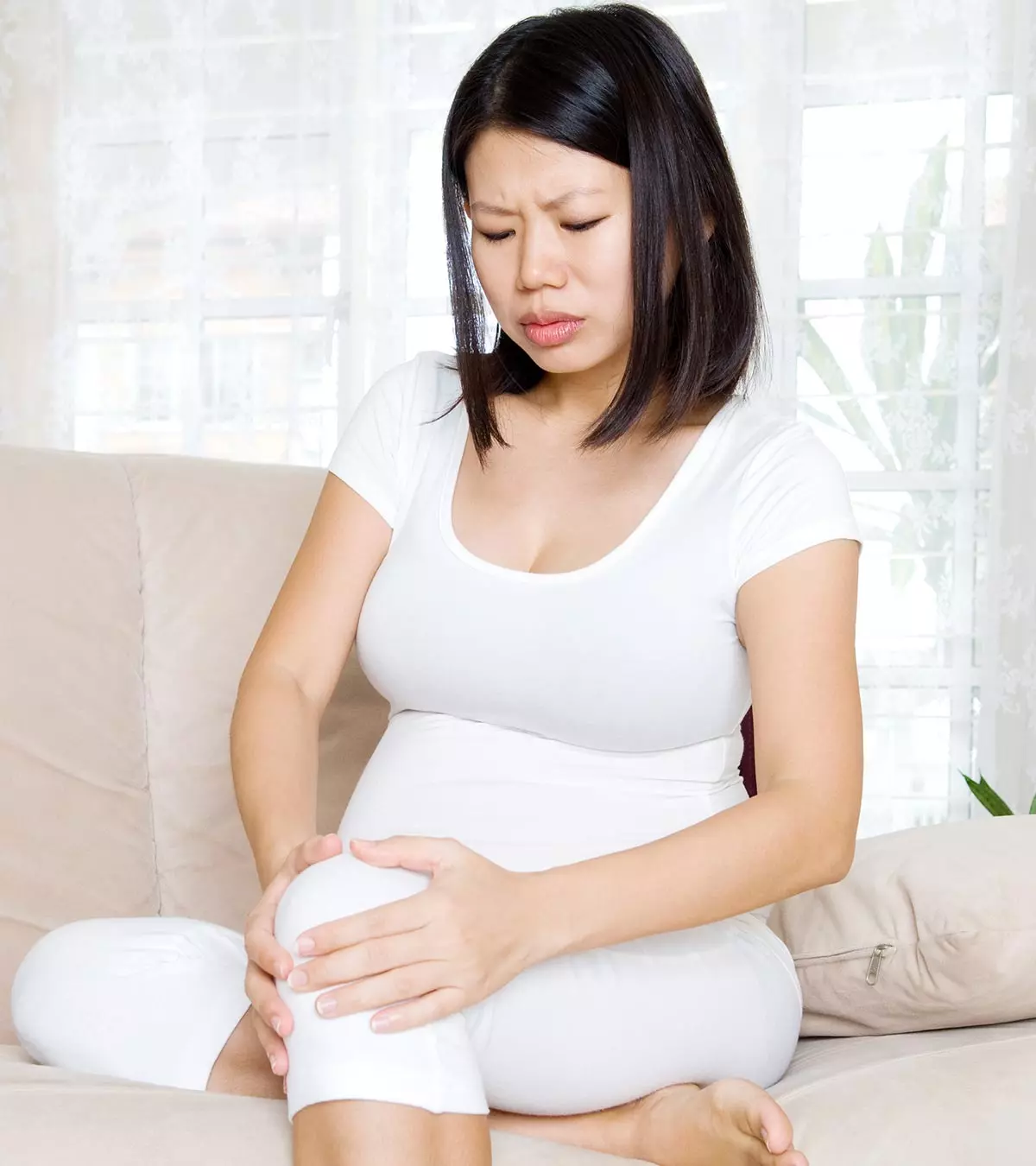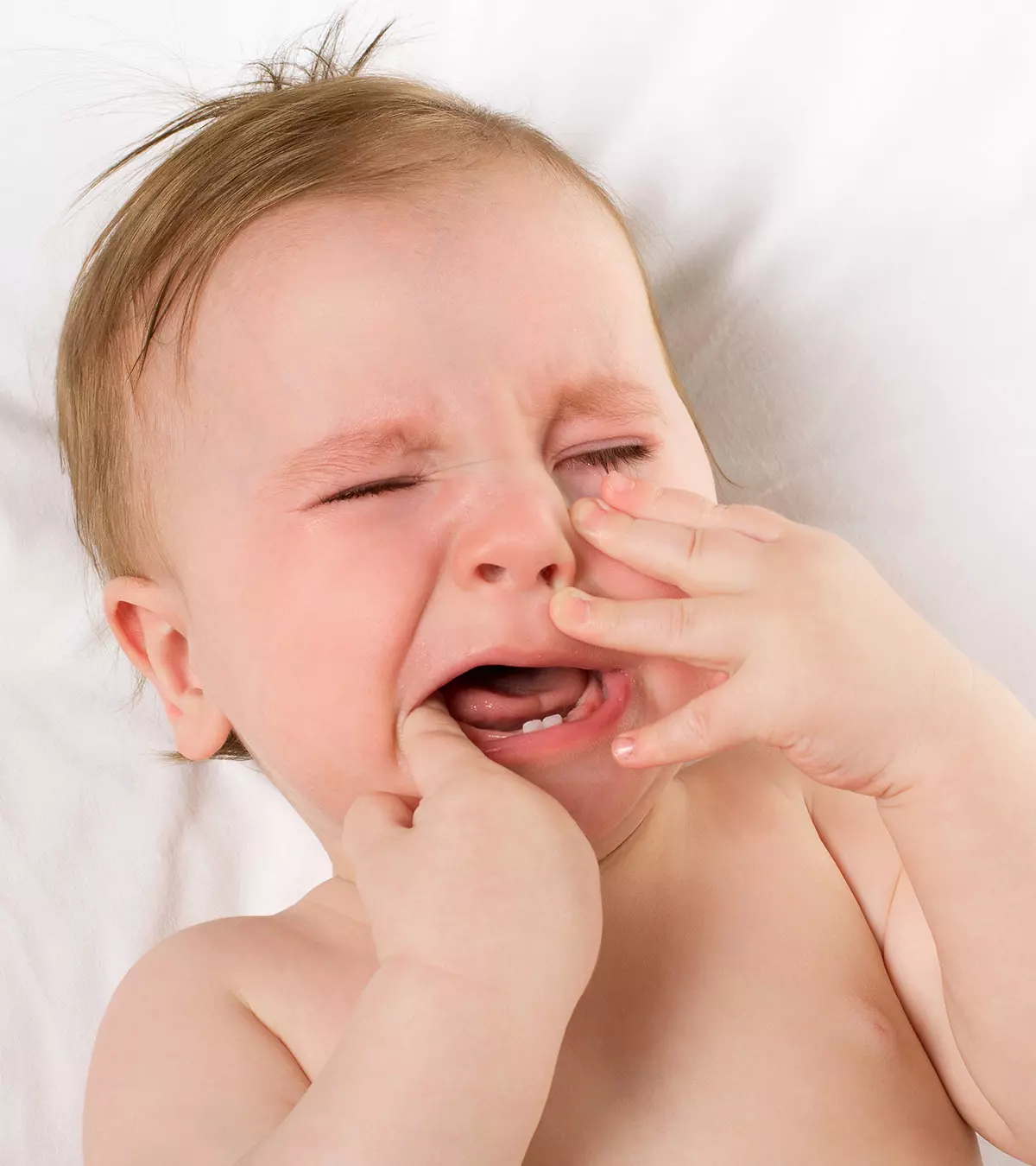
Image: Shutterstock
Gums are the soft tissue in the mouth that may swell occasionally. Swollen gums in babies are primarily caused by teething. However, there may be other reasons, such as an injury or infection. Although swelling in gums due to teething is normal and does not need treatment, swelling because of issues such as cysts may need medical intervention. Therefore, if you feel the swollen gums are causing discomfort to your baby, it is advisable to consult a doctor. Read the post to understand what causes swollen gums in babies, its symptoms, and ways of management.
Key Pointers
- Swollen gums in babies can be caused by teething, injury or illness.
- Teething-related gum swelling is normal, but swelling caused by other conditions may need medical attention.
- Signs of teething-related swelling include sore and swollen gums, as well as a lump of mushy, red tissue.
- Abnormally swollen mouths in newborns may be due to eruption cysts or hematomas.
- If gum swelling is unusual or accompanied by a fever, rashes, or blisters, consulting a doctor is recommended.
What Are Swollen Gums?
Healthy gums are tight, vascular, and pink in color. But when swollen, the gums might appear loose, bulky, or fiery red, indicating the need for immediate dental care. In some severe cases, the gums also tend to swell to the extent of covering the tooth partially. A baby may have swollen gums due to various reasons.
Why Are My Baby’s Gums Swollen?
The following conditions and factors can cause a baby’s gums to swell.
- Teething: Teething is the process of tooth eruption and is an important part of dental development in babies. Baby teething may start at the age of around six months and last until around 30 months, by when the baby has a set of 20 deciduous/ milk teeth (1). Swollen gums due to teething will subside once the tooth erupts out of the gums. Normal teething symptoms include excessive drooling, mild fever, irritable mood, loss of appetite, sleeplessness, repeated pulling of ears, and putting fingers and toys in the mouth.
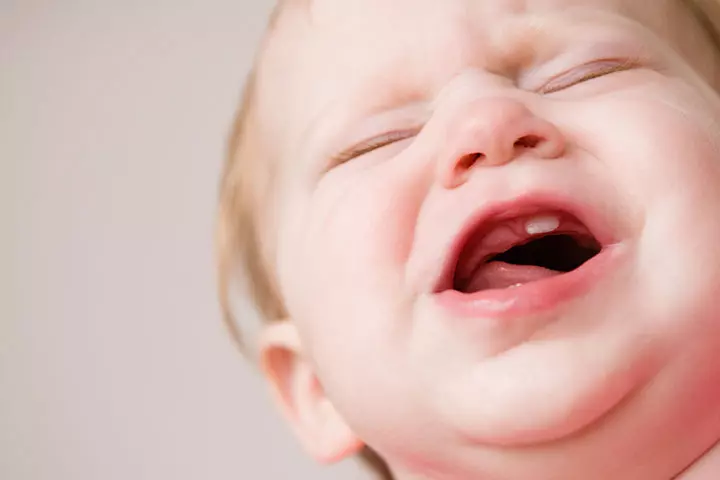
- Eruption gingivitis: A little inflammation of the gums (gingiva) commonly occurs as the tooth tears the gum open and erupts into the oral cavity. But in the case of poor oral hygiene, the inflammation might get aggravated, leading to a condition called eruption gingivitis. It usually subsides as the hygiene levels improve (2).
- Trauma: Any fall or injury might also cause swelling in the gums of the baby. Although not very common, the ones mentioned below are some other reasons for swollen gums in babies.
- Primary herpetic gingivostomatitis: It is a viral gum infection caused by the herpes virus. This infection usually affects children below the age of six years and may affect babies too. Primary herpetic gingivostomatitis can cause severe gum swelling, gum bleeding, and a mild fever (3).
- Drug-induced gingival overgrowth: Certain medicines like immunosuppressants (Cyclosporine) and anticonvulsants (Phenytoin) might also cause the gums to swell (2).
 Quick tip
Quick tipWhat Is Normal Gum Swelling In Babies?
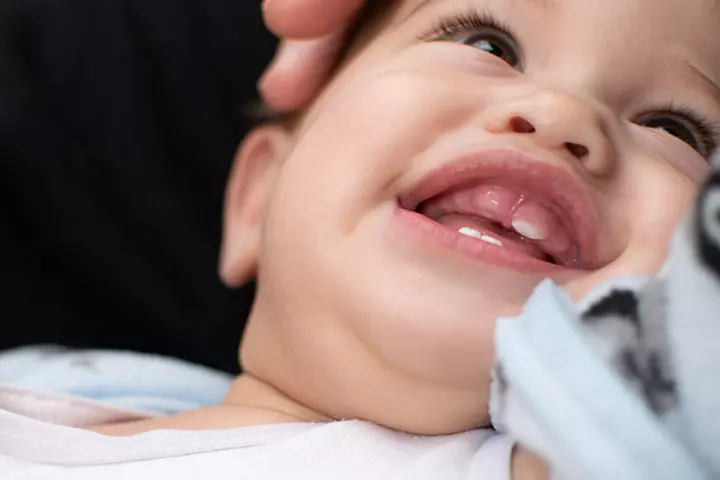
Swelling caused due to teething is known as normal swelling. Teething-related swelling happens at the place in gums where a tooth is about to emerge. You can feel a hard lump when you touch the spot of tooth eruption.
Following points indicate the normal swelling due to teething in your baby’s mouth:
- Gums are usually tender and swollen when the baby is teething.
- The gums could appear as a lump of soft, mushy, and red tissue.
- Wash your hands with soap and water. Move your finger on the gums to feel for a bulge or protrusion. It indicates a teething site.
Partially erupted baby teeth could appear as or like small pieces of pearls.
Knowing the eruption schedule of the baby’s teeth may help you know when to expect normal swelling of gums (4).
What Is Atypical Swelling?
The following conditions may cause abnormal or atypical swelling of gums in babies.
- Sometimes a rounded and translucent swelling may appear at the site of the tooth’s eruption. This is known as an eruption cyst (5) and is usually the accumulation of fluids in the root of the tooth.
- Blood may accumulate around the erupting tooth and cause a purple-colored or bluish swelling on the gum. It is called eruption hematoma(5).
It is good to take the child for dental checkups if you notice a cyst or a swelling of the gums. In most cases, the condition is benign and seldom a cause of worry. A cyst may spontaneously burst, causing the tooth to erupt. But sometimes a doctor may have to drain the cyst to expose the tooth (5).
There are some other scenarios when you should see a doctor for swollen gums in babies.
When To See A Doctor?
See a doctor if you notice atypical swelling of the gums. You should also see a doctor if swollen gums are accompanied by the following conditions (6)(7).
- Swollen or red tongue, lips, and throat
- Rashes and blisters on other areas of the body
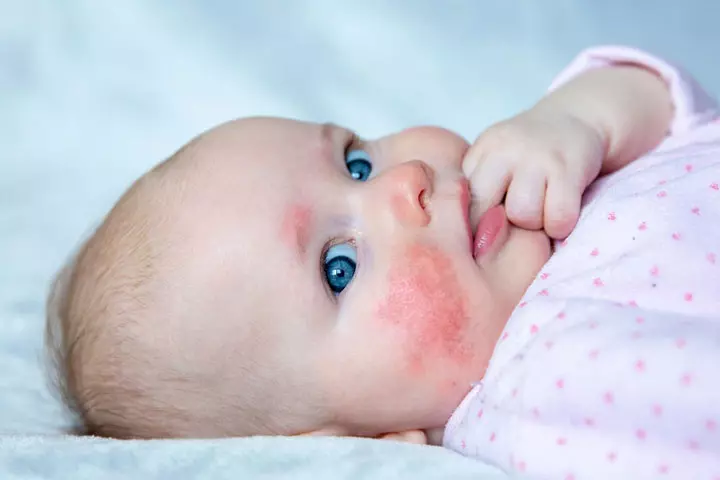
- A fever higher than 100.4o F or 38o C
- Baby experiences difficulty in nursing or formula feeding
What Is The Treatment For Swollen Gums?
There is no specific treatment for teething-related swelling of the gums. If the baby has a cyst or some other problem, then your doctor will treat the condition accordingly.
The doctor may prescribe ibuprofen or acetaminophen for teething pain and symptoms like a mild fever that may be associated with teething (8). Use it only for the prescribed quantity and duration, as stated by your baby’s pediatrician.
Teething woes may not always need medical intervention. No medicines or dental teething gel must be used without a doctor’s advice.
How Long Do Swollen Gums Last?
Gums swell a few days before the tooth is about to erupt. The swelling and inflammation subsides as the tooth breaks open into the oral cavity. See a doctor if the gums remain swollen for more than a week.
Tips And Home Remedies For Swollen Gums
Teething-related swelling of gums is manageable at home with the use of the following methods (9).
- Good oral health and hygiene play a primary role in preventing infections that can cause swollen gums.
- Create a calm and soothing environment to make your baby feel more comfortable and relaxed during teething.
- You should regularly clean the baby’s gums with a clean gauze piece.
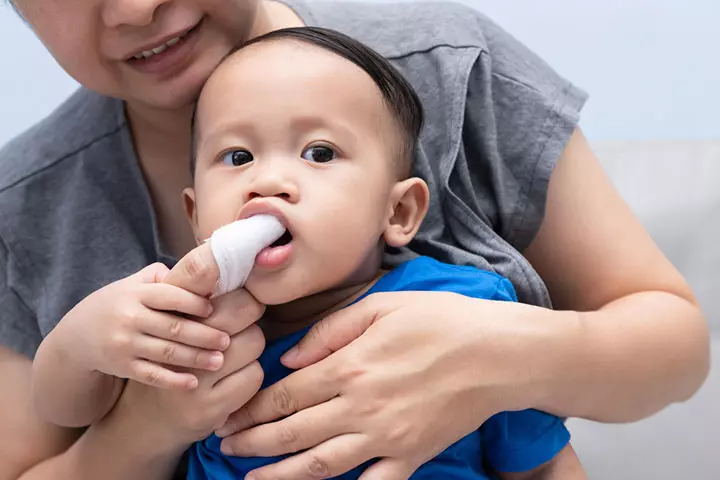
- Start toothbrushing as soon as the baby’s first tooth erupts.
- Add only water on the brush, unless a doctor advises to add toothpaste.
- Biting on cold spoons or cold pacifiers may also help.
- Chewing on clean washcloths that are frozen in the freezer for a few minutes and taken out before they are rock solid, could help comfort the infant.
- Commercially available teething rings are helpful for the baby who is undergoing teething woes. Avoid the ones with liquid as accidental ingestion of the liquid can be harmful.
- Cold foods (but not frozen) or teething crackers are only suitable for babies who are already eating solid food. Try to limit foods with added sugar or salt.
 Point to consider
Point to considerWhat You Should Not Use For A Baby’s Swollen Gums
- Avoid using any topical anesthetic gels for teething without a pediatrician’s prescription because they don’t aid pain management and might also have side effects (10).
- Analgesics such as aspirin should not be given to babies for pain relief as it may increase the risk of Reye’s Syndrome, a liver disease (11).
- The US FDA suggests not using any topical lidocaine gels for teething as it might have side effects (12).
- It also warns against the use of homeopathic medicines for teething(13).
Foods To Avoid When Babies Have Swollen Gums
While there is no research-based evidence, anecdotal evidence shows that avoiding some food items might avoid further inflammation and irritation to the baby’s gums.
- Citrus fruits and juices may cause irritation to the already inflamed gums.
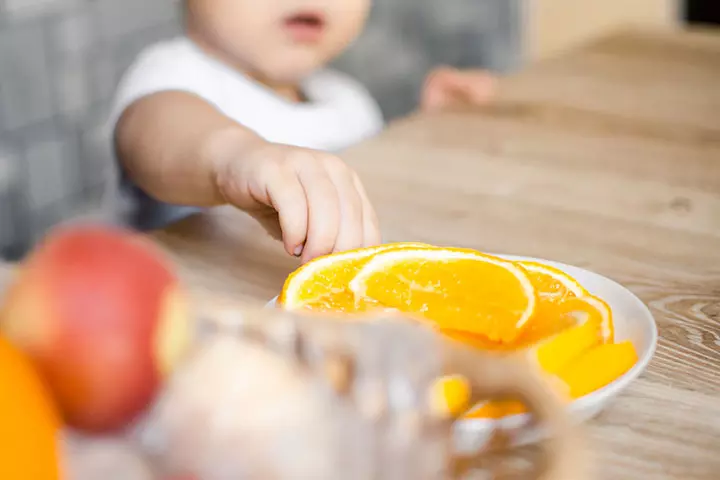
- Tomatoes may cause sensitivity or a stinging sensation in the gums due to the tangy taste.
- Although babies do not consume them commonly, avoid giving anything spicy or excessively salty as they might cause a burning sensation on the gums.
Babies chew a lot during the teething phase. If they put their toys and teethers in their mouth, it is not a matter of worry. But you need to keep their teething toys clean and make sure they are not putting anything harmful in their mouth.
Frequently Asked Questions
1. Can breastfeeding or bottle-feeding cause gum pain in babies?
Some studies show that bottle-fed babies are more likely to have dental caries than breastfed ones. Therefore, gum pain and other oral problems may also be more in bottle-fed babies. Avoid putting your child to sleep with a bottle since it may cause the milk to pool in the mouth. This may expose gums and teeth to milk or formula sugars for too long, increasing the risk of oral health problems (16) (17).
2. Can gum pain in babies lead to tooth decay or other dental problems?
Gum pain may be a symptom of tooth decay or other dental problems. However, it is not the cause of such conditions.
3. Are there any signs to watch out for besides drooling and chewing?
Additional signs of teething may include swollen gums, fussiness, disrupted sleep, loss of appetite, and mild fever. If you notice severe symptoms, consult a pediatrician, as it could indicate something other than teething.
Many factors may cause gum pain in babies, with teething being the most common. Consult a pediatrician to know if the gum swelling is due to teething or other issues. Usually, there may not be medical interventions for teething in toddlers and babies. However, the doctor may prescribe painkillers to reduce the pain caused by teething. Your pediatrician may suggest treatment for gum pain unrelated to teething. Do not administer any medication to the baby unless approved by a doctor. You may also try a few home remedies after seeking a doctor’s approval.
Infographic: Home Remedies And Things Not To Use For Your Teething Baby
Teething is a natural process that all babies go through, and it can be uncomfortable for them. However, some home remedies may help relieve teething pain in babies. In the following infographic, you will find a list of home remedies you can try. If your baby is still in pain, contact your doctor for advice and guidance. Illustration: Momjunction Design Team
Illustration: Remedies To Treat Swollen Gums In Babies When Teething
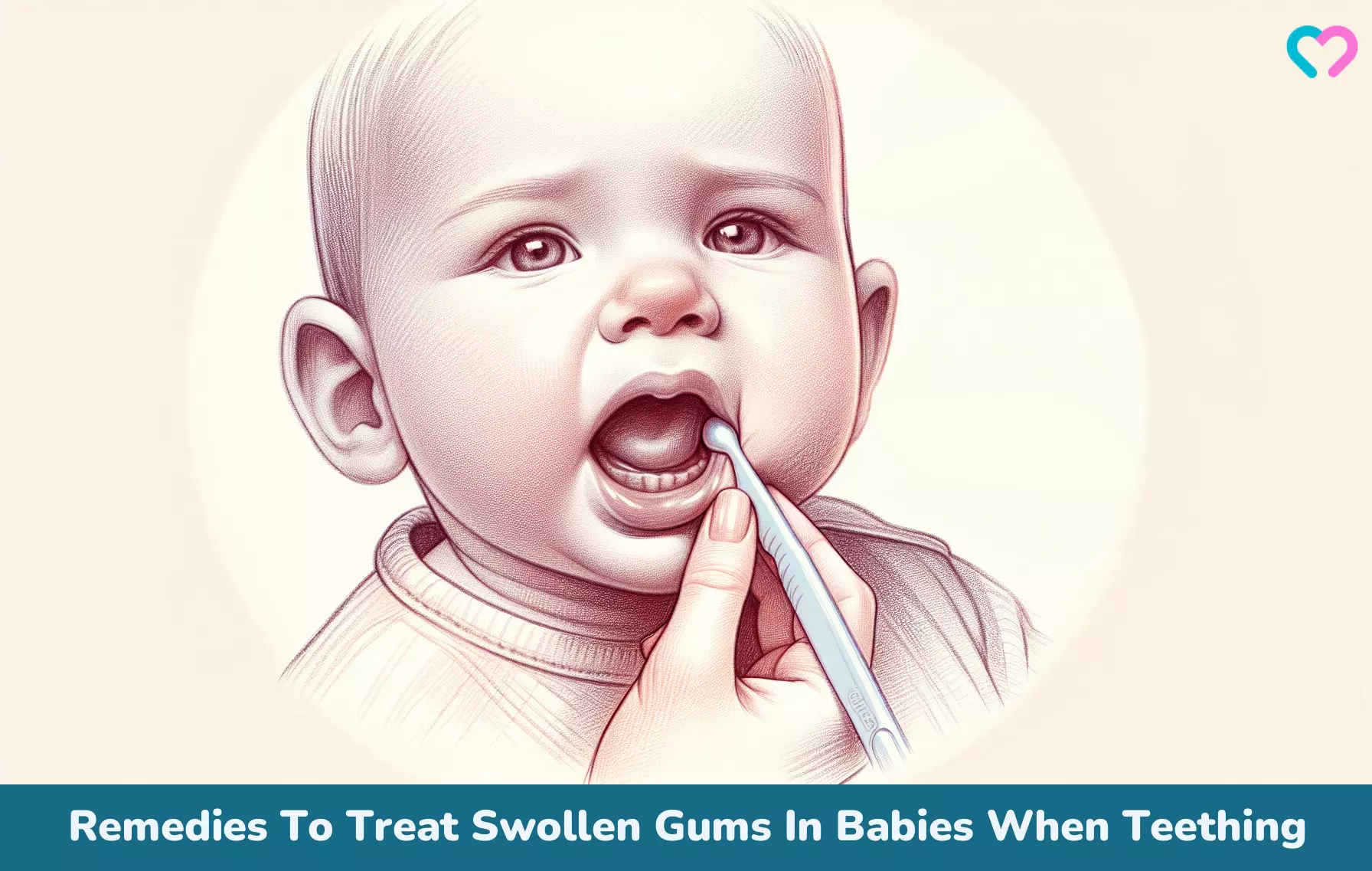
Image: Dalle E/MomJunction Design Team
Teething pain is inevitable once your baby starts getting teeth, but you can help your toddler manage this pain with simple tips and tricks. Learn how to soothe your toddler’s discomfort and keep them smiling!
References
1. Lisa Markman; Teething; Pediatrics in Review.
2. Hayat Al-Ghutaimel et al.; Common Periodontal Diseases of Children and Adolescents; International Journal of Dentistry.
3. Ran D. Goldman; Acyclovir for herpetic gingivostomatitis in children; Canada Family Physician.
4. Tooth eruption The primary teeth; American Dental Association.
5. Preeti Dhawan et al.; Eruption cysts: A series of two cases; Dental Research Journal.
6. Researchers say Rise in Temperature With Teething Usually Not A Fever; American Academy Of Pediatrics.
7. Pamela DenBesten; Is teething associated with diarrhea?; Western Journal Of Medicine.
8. Eda Haznedaroglu and Ali Mentes; The Internet versus pediatricians as a source of infant teething information for parents in Turkey
9. Mangla Sood, Sankalp Sood; Problems with Teething in Children; Pediatric OnCall
10. Rais Vohra et al.; Pediatric Exposures to Topical Benzocaine Preparations Reported to a Statewide Poison Control System; Western Journal Of Emergency Medicine.
11. T K Oman et al.; Topical choline salicylates implicated in Reye’s syndrome; The BMJ.
12. FDA Drug Safety Communication: FDA recommends not using lidocaine to treat teething pain and requires new Boxed Warning; U.S. Food and Drug Administration
13. In the News: Homeopathic Teething Gels and Tablets; U.S. Department of Health and Human Services.
14. How to Prevent Tooth Decay in Your Baby; American Academy of Pediatrics
15. Baby Teething Pain; American Academy of Pediatrics
16. Walesca M. Avila et al.; Breast and Bottle Feeding as Risk Factors for Dental Caries: A Systematic Review and Meta-Analysis; NCBI
17. Why It’s Important to Take Care of Baby Teeth; American Academy of Pediatrics
Community Experiences
Join the conversation and become a part of our nurturing community! Share your stories, experiences, and insights to connect with fellow parents.
Read full bio of Dr. Fadel Husrom
Read full bio of Dr. Ritika Shah
Read full bio of Rohit Garoo
Read full bio of Shinta Liz Sunny








